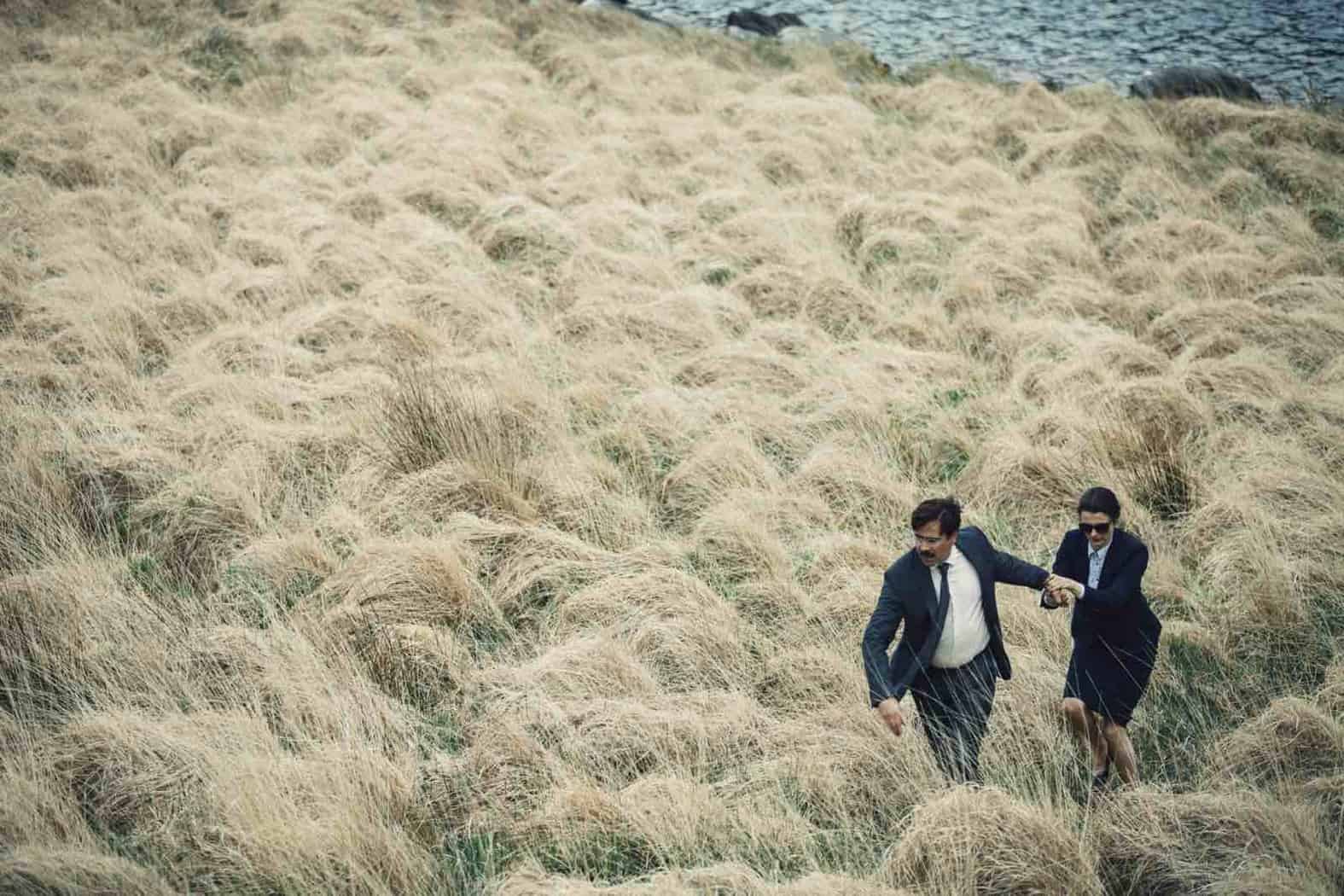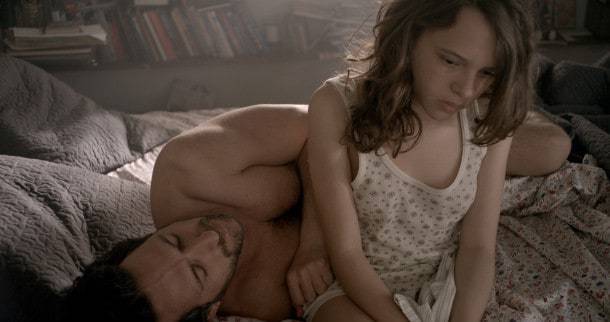In this review of A Bigger Splash, we explore Luca Guadagnino’s erotic joyride, which is about the breaking point: what we think we want, and what happens when we get it — or don’t.
This is the 5th and final feature in our special A Bigger Splash week. Read our features on three of the film’s leads: Dakota Johnson, Tilda Swinton, and Matthias Schoenaerts.
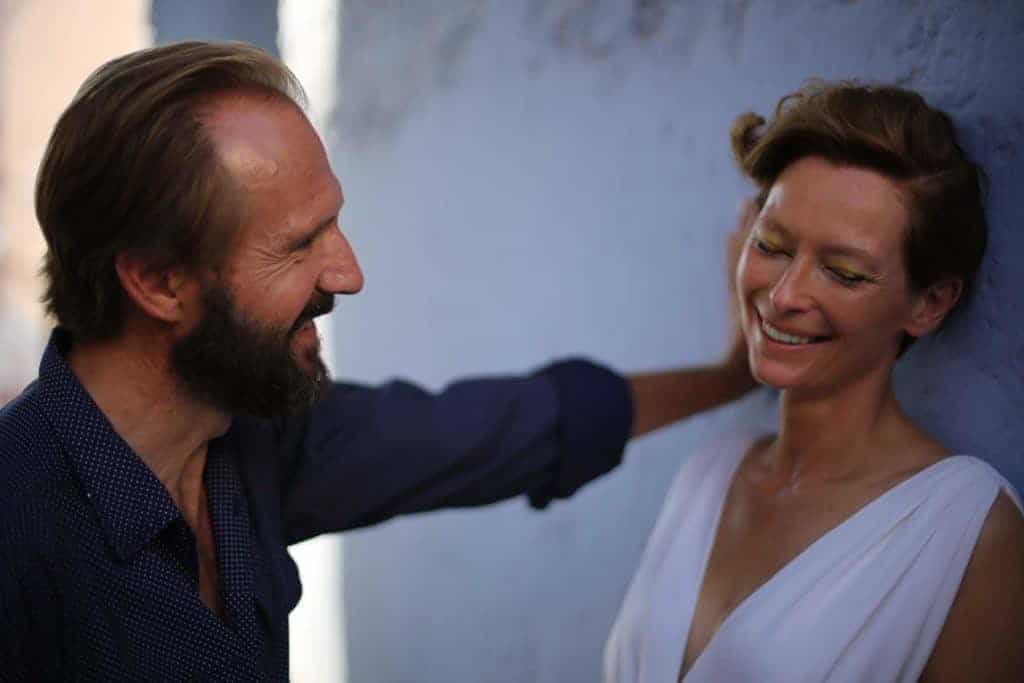
Luca Guadagnino’s erotic joyride, A Bigger Splash, opens on a performance. The camera slides past stadium scaffolding through the smoke, the crowd rumbles, and rock star Marianne (Tilda Swinton) takes the stage. Then we cut to a completely private moment: Marianne and her younger paramour Paul (Matthias Schoenaerts), sunbathing in the nude at their idyllic Italian villa. The camera doesn’t leer or linger; their nudity is casual. This moment is for them alone. It’s almost their last before Marianne’s ex-lover Harry (Ralph Fiennes) blows in with his newfound daughter, Pen (Dakota Johnson), in tow, to pursue Marianne.
Guadagnino’s focus is examining social performance, especially how professional performance relates to private life. Marianne is a rockstar who sings for a living but can’t speak. Harry is a behind-the-scenes record producer; he listens for a living but won’t stop talking. Paul is an observer, a documentarian, who tries to stay out of the conflict but ends up inciting the most destructive act. Pen, the only one without a profession, is the biggest mystery, for she’s still figuring out who she wants to be in the spotlight.
Harry seduces the audience, even as he’s been horribly juvenile, the same way he seduces Marianne. Even though Harry knows Marianne is supposed to be resting her voice from throat surgery, he tries to tempt her into banter. She merely gesticulates playfully, but we can see he sends her, wakes her up in a way Paul, her caregiver who pleas with her to stay mute, doesn’t. But that’s why Harry is dangerous. Yet Harry is never more transparent than when he’s alone, looking on with jealousy and sadness while Paul and Marianne casually cuddle. He takes a moment to feel his hurt before blazing onto the scene, ready to dad-dance your heart out and steal the show.
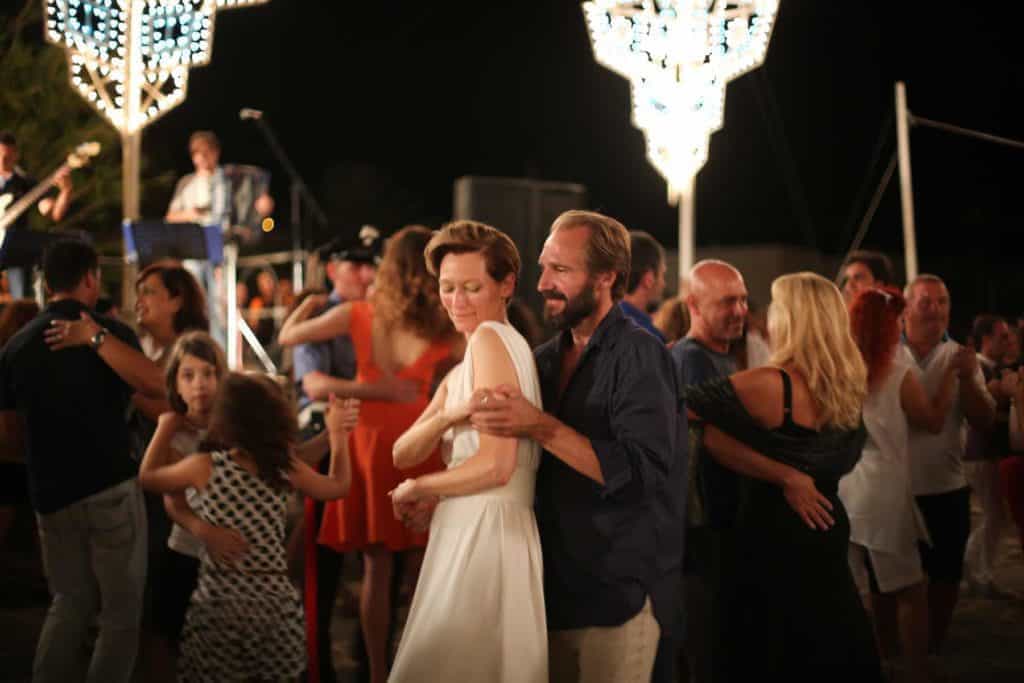
Between two people, love is a dance, but between four, it becomes a turf war. Paul and Marianne start to assert their sexual and domestic compatibility even when they’re alone. Paul territorially reminds Marianne to take her pills; Marianne drapes herself all over Paul, as much to remind Harry of her happiness as to reassure herself that it’s real. Although Paul openly disdains the inauthenticity of Harry’s attention-seeking manner, he isn’t immune to the threat beneath this performance either. Before Marianne heads out for her first evening with Harry, Paul initiates cunnilingus with her under the guise of intimacy and lust. But it’s almost a dare — this is what we are together — before reminding her to rest her voice with Harry.
Flirtation is sending signals that you don’t have to fully commit to. Having an audience emboldens you because you can retreat into the suggestion that it was all in jest. For Harry, a windbag and an exhibitionist, having an audience around gives him a safety net to push things further. If there’s someone watching, he can flirt with his daughter and play the suitor, because everyone knows it’s just play. Around Paul and Pen or the people of the town, Harry and Marianne play with their image as lovers, trying it on for size without having to commit to pursuing it further. They can pretend their affection for one another is purely nostalgia, safely invoking old intimacies through old stories, old jokes, and old music.
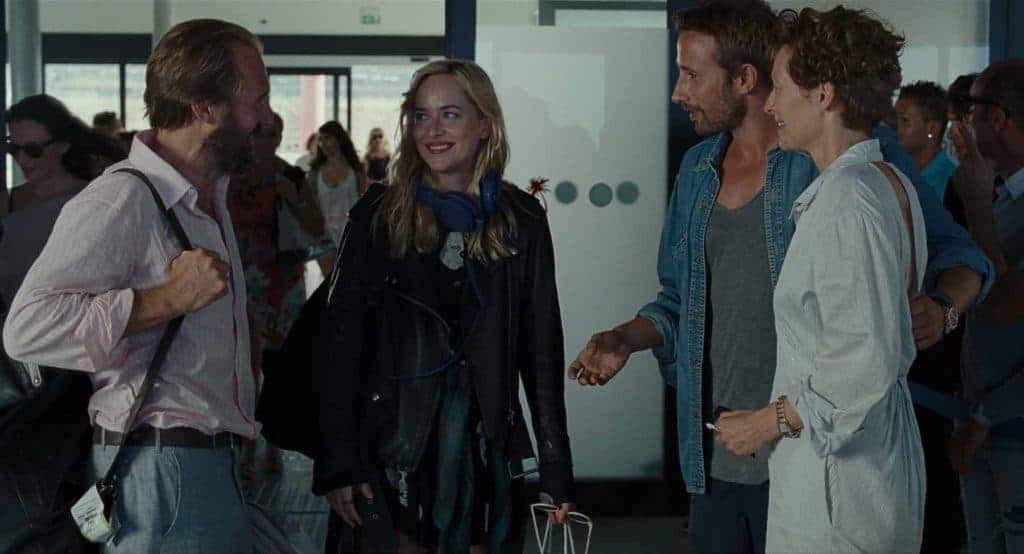
While Marianne and Harry play at performing their relationship, Pen’s entire identity is a carefully constructed ruse. She parades around in a bikini, daring Paul to look at her, challenging Harry not to, and provoking Marianne by deliberately taking aim at her men. She half-jokingly implies she’d like to sleep with Harry, but her confidence falters when she’s alone with him: she covers up and becomes girlish — his child. But when Paul seems intent on treating her as a child, she first challenges him to treat her as a woman — and then plays into his attempt at infantilizing her, his defence mechanism for maintaining distance. Pen girlishly invites Paul to watch her do a handstand in the pool, as a prelude to getting him alone and away, so she can strip down and test him.
Guadagnino blurs the line between genuine connection, two characters talking or flirting in a two-shot, and merely fighting for attention. In group scenes, Guadagnino cuts between closeups of each of the characters observing each other, taking notes, and puzzling out their relationships. As the only one without a direct stake in the love triangle, it’s often Pen’s gaze that we follow, her reactions that Guadagnino returns to as the other three grapple for power. Yet when Marianne and Harry head off shopping together, Guadagnino holds them in long uncut two-shots, casually holding hands. We’re allowed into their what-if fantasy.

Though there’s safety in numbers, Pen and Harry aim to get their prey alone, where they’re forced to confront each other — where sex is possible. What they don’t realise until it’s too late is confrontations end flirtations. It’s only alone, when there’s no-one to hide behind, that things start to break. Harry is looking for a new beginning with Marianne; she isn’t quite sure if she’s looking for an ending. Pen tempts Paul into a secluded spot; judging by the awkward silence that follows when they all reconvene, it went further than it should have. Instead, Guadagnino cuts back and forth between each of the four characters, staring at each other, working out what needn’t be said.
It would be easy to file A Bigger Splash away as vacation porn, a delectable ride through bliss and betrayal. It luxuriates in the visceral: beautiful bodies exposed and on display, the guts of fish being prepared for dinner, and the costumes of leisure and pleasure. But the film’s unofficial theme song, the Rolling Stones’ “Emotional Rescue”, reminds us there’s more to this. A Bigger Splash is about the breaking point: what we think we want and what happens when we get it — or don’t. Once everyone’s sought pleasure, they’re charred from the fire of it, and there’s no going back.
After our review, read more from A Bigger Splash week
Read our interview with Director Luca Guadagnino.
Read Dave Crewe on how Dakota Johnson challenges Hollywood femininity.
Read Kyle Turner on the queer cult stardom of Tilda Swinton.
Read Alex Heeney on Matthias Schoenaerts and the art of not speaking.
